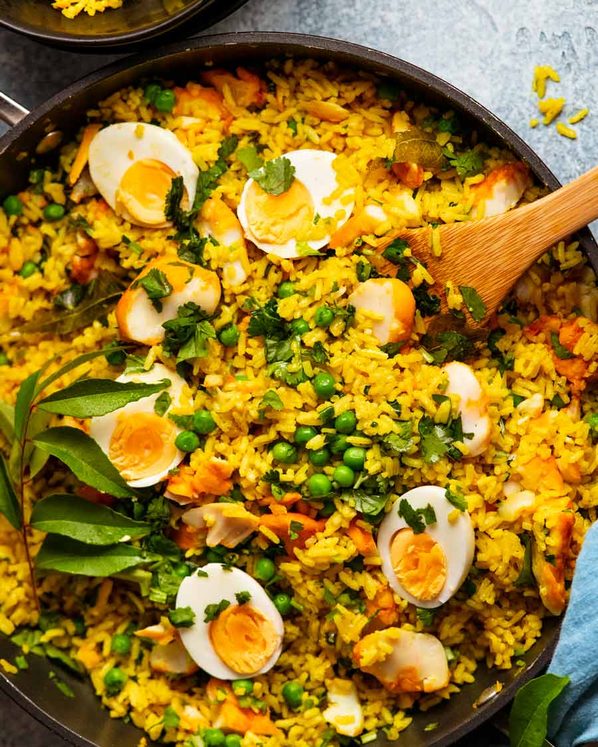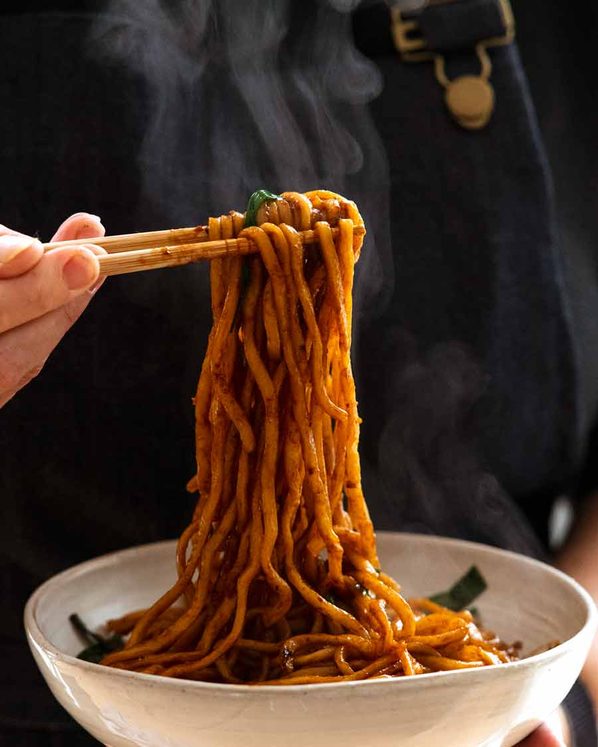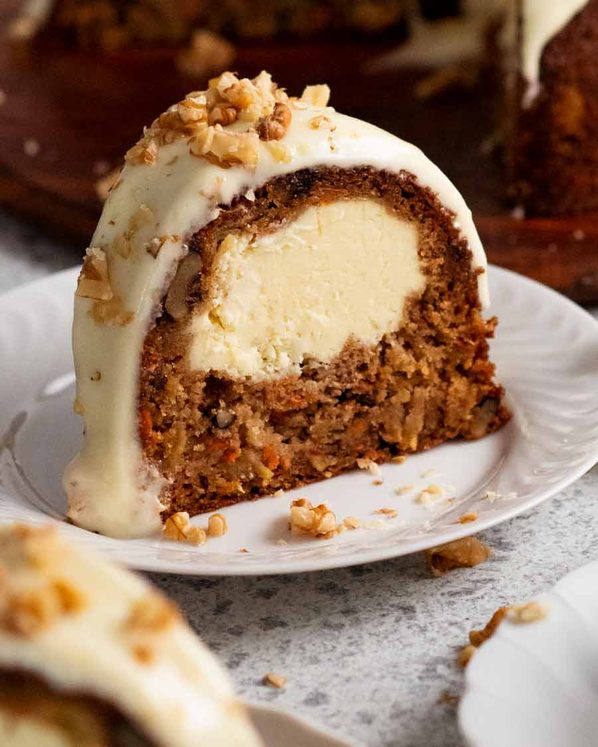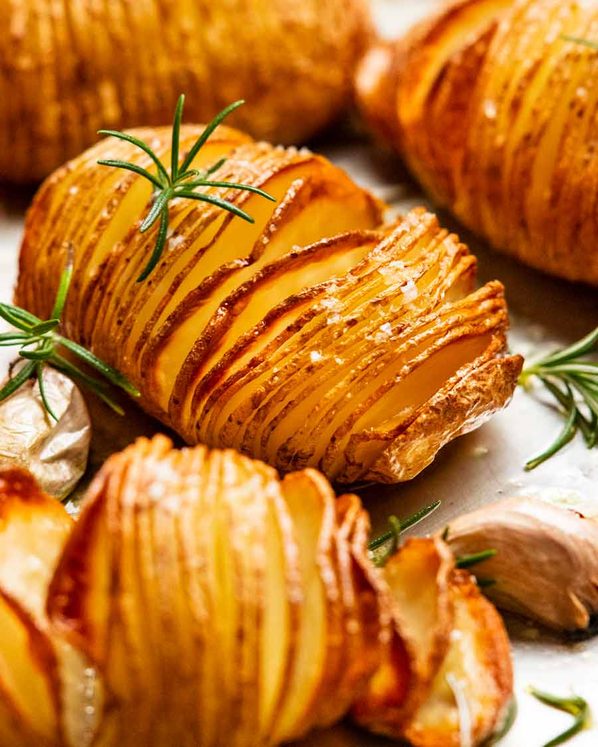Kedgeree – a traditional English dish comprised of curried rice with smoked fish and boiled eggs. Think of it like a British biryani! A fabulous, economical fish and rice recipe that’s easy to make and seriously delicious.
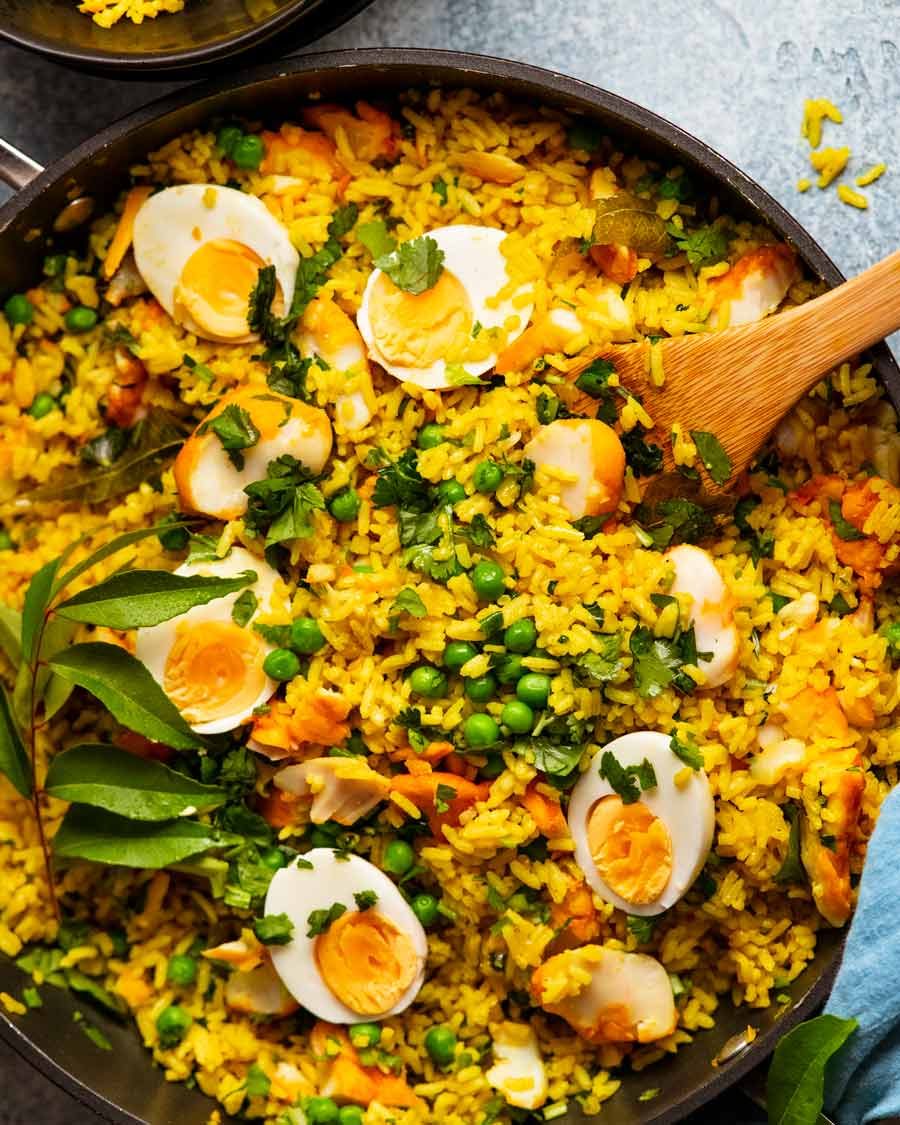
Kedgeree – English smoked fish and rice
Is it totally uncouth to call Kedgeree an “English biryani”?? It’s just how I sometimes think of it and I mean it in the most flattering way. It’s a pretty well established fact that I consider biryani to be one of the great rice dishes on this planet.
In all seriousness though, Kedgeree is a wonderful example of true fusion food. It brings together rice and spices from the Subcontinent with classic English breakfast foods like boiled eggs and smoked fish. The result is a delicious and unique Anglo-Indian whirlwind of flavours and textures!
Traditionally kedgeree was a breakfast dish in Britain but these days it’s served at anytime throughout the day. Straightforward to make, if you’re new to using smoked fish in meals, it’s an excellent way to start!
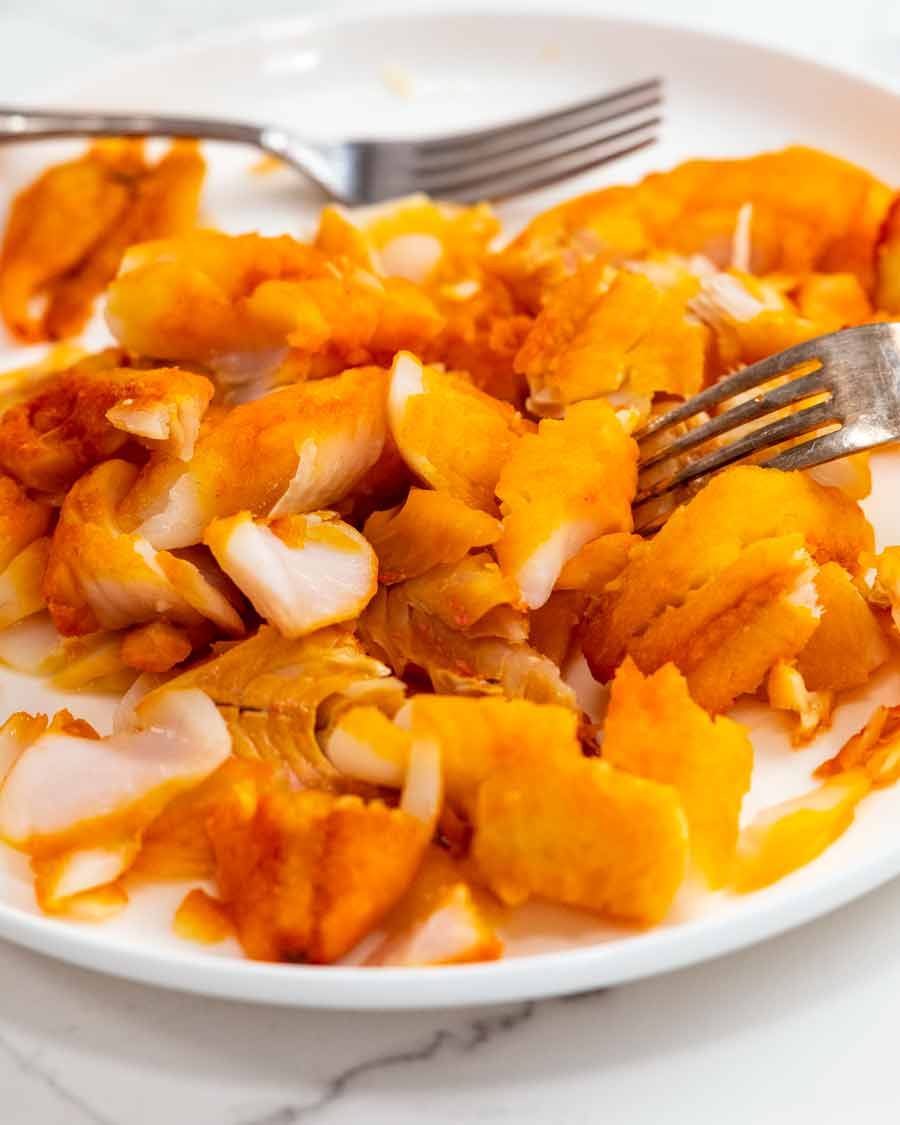
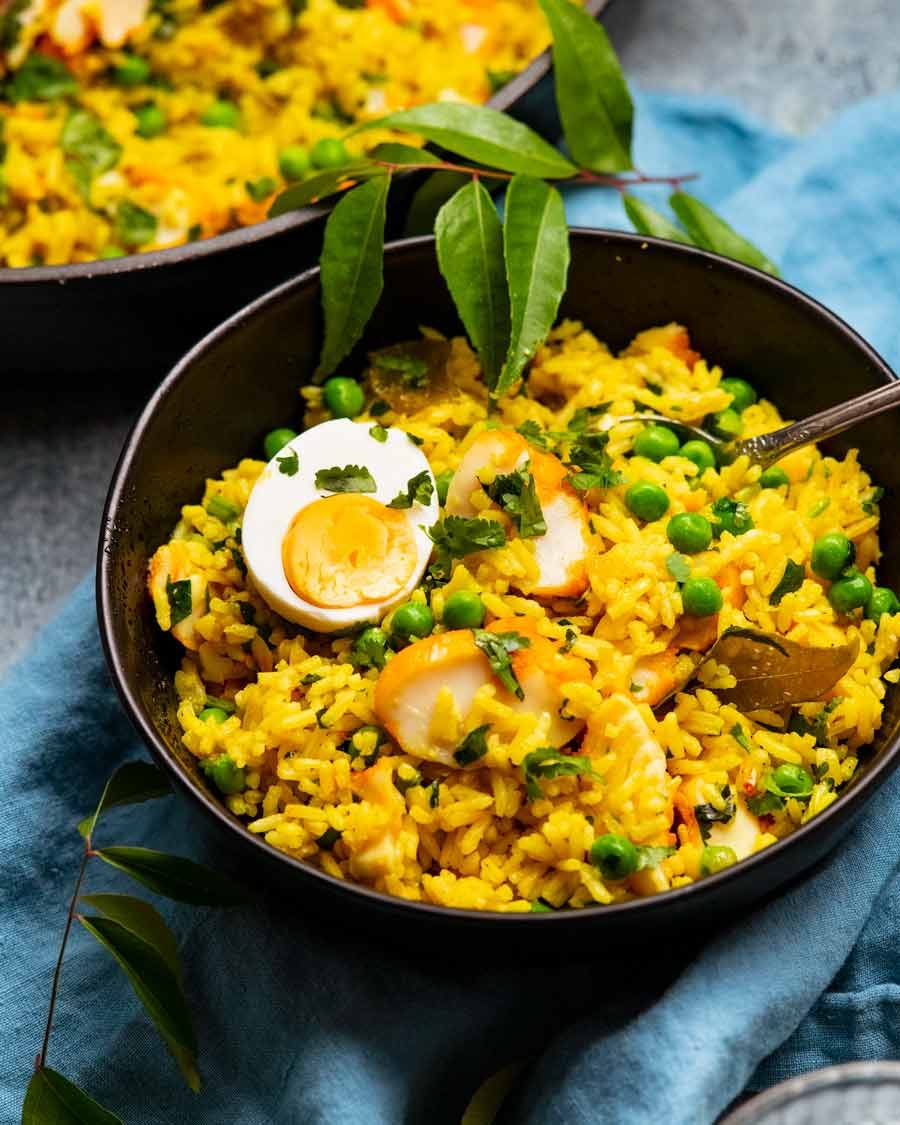
Ingredients in Kedgeree
I’m sure there are fancy versions of kedgeree out there but we’re making a traditional version today. The hero ingredient is the smoked fish. Smoked haddock is probably the most traditional choice though cod makes an excellent alternative.
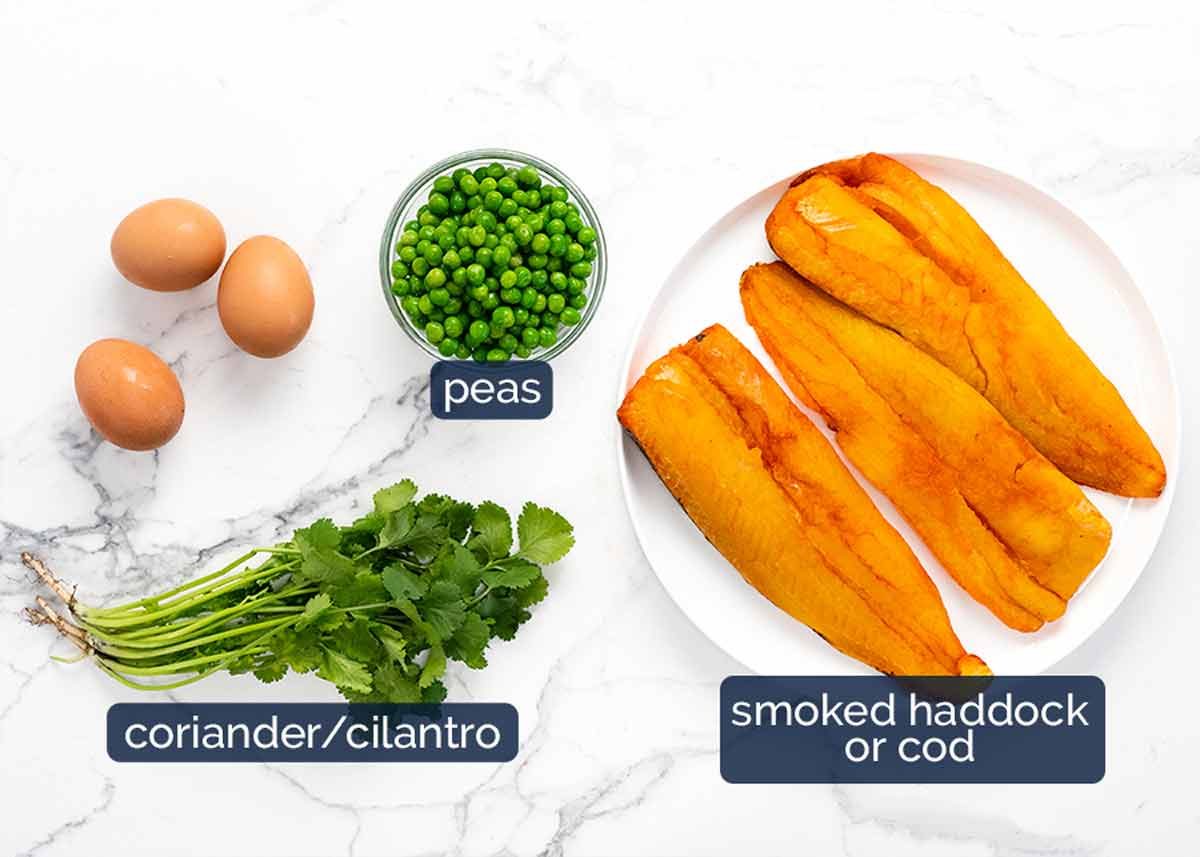
-
Smoked haddock (or cod) – Smoked haddock is a preserved fish fillet product sold at grocery stores at the seafood counter, deli or packed in the fridge section. Oh, also fish mongers of course! It offers an especially economical way to use fish in a meal because smoked haddock/cod is firstly much cheaper than most fresh fish, only about $15/kg here in Australia compared to, say, raw snapper fillets which are around $50/kg. Being packed with flavour, a little also goes a long way.
What exactly is smoked haddock? Smoked haddock is fresh haddock (a northern European cod) that’s been brined (ie. infused with salt) then cold smoked to infuse it with a lovely smokey flavour. When haddock is naturally smoked, it is a pale yellow-brown colour. Commercial produced smoked haddock tends to lack colour so is often dyed an orange colour to make it look more like the “real thing”.
The fish is poached and then flaked into chunks. We use the flavoured poaching liquid to then cook the rice.
-
Boiled eggs (9 minute eggs using my boiled eggs recipe) – Traditional addition along with smoked fish. Eggs also stretch the fish by adding further protein.
-
Peas – For pops of freshness, colour and introduce some good vegetable matter into our rice dish.
-
Coriander/cilantro – For stirring through and garnish.
Rice and curried butter
The thing that makes Kedgeree special is the spiced butter!
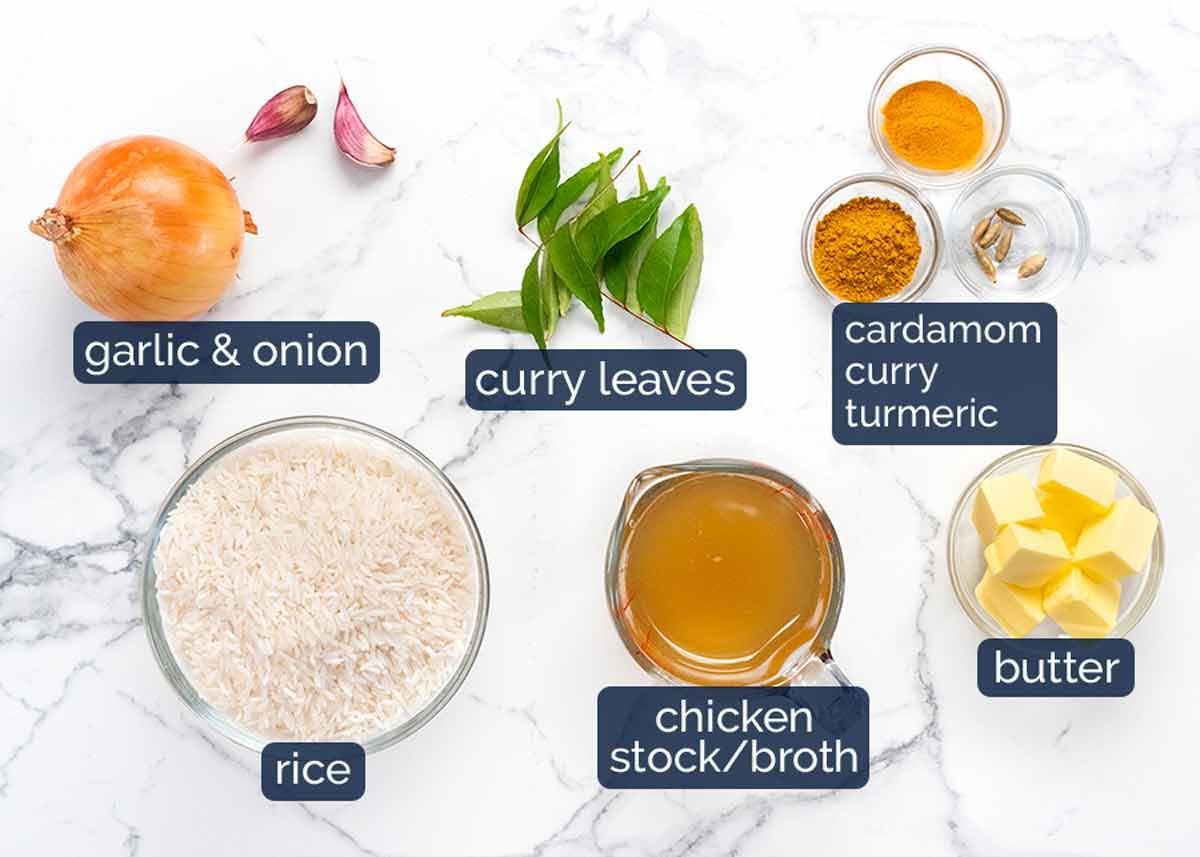
-
Rice – Carries the bulk of the dish! Long grain or basmati rice is best for this dish, for nice long-shaped rice grains and the desired fluffy texture. Medium grain and short grain (sushi) rice will work too though the rice is a little sticker, as is the nature of the rice.
Recipe is not suitable for risotto rice, paella rice, brown rice, wild rice, quinoa or faux rice (cauliflower rice etc).
-
Spices: Curry powder and turmeric – You can really use any curry powder here though traditionally used is an English / Western curry powder (as opposed to authentic Indian or Asian curry powder mix). It’s not spicy (unless you opt for the HOT type!), it’s a mix of warm spices including cumin, coriander, clove and turmeric. I use Clives of India and Keens.
We add a little extra turmeric to brighten the dish’s colour, otherwise the rice can look a little brown.
-
Curry leaves and cardamom – Additional nods to the Indian heritage of this dish. Curry leaves for fragrance and because it looks attractive, while cardamom for its unique perfume and flavour. However both are optional!
Curry leaves – A magnificent ingredient used in Indian/Sri Lankan cooking! Fairly widely available these days in grocery stores in Australia (Coles, woolies, Harris farms), leftovers freeze 100% perfectly. Use in Vindaloo, Dal, South Indian eggplant curry and Samosa Pie. Also easy to grow (I have a plant *says the plant-killer, smugly*) (PS. curry plants are indestructible)
-
Butter – For sauteing and rich flavour.
-
Onion and garlic – Usual base flavourings.
-
Chicken stock – Cooking the rice in the chicken stock flavoured with the fish imparts a deliciously savoury taste to the rice that’s a step up the flavour ladder from plain water.
Note: Store-bought packet stock will normally have salt already added. This plus the salt in the smoked fish seasons the dish.
Why not fish stock? Because mass produced store bought fish stock is not very nice! However if you have fresh fish stock and prefer a more seafood-y tasting biryani, go for it!
How to make Kedgeree
Kedgeree is made by poaching the fish, then cooking the rice in the poaching liquid. The rice is then tossed in a flavourful curried butter before tossing the fish back in and finishing with boiled eggs.
Cooking the smoked fish
Cold smoked fish (other than salmon or other sashimi grade fish) needs to be cooked before eating. For Kedgeree, the fish is gently poached in stock which is then used to cook the rice. Flavour retention to the max!
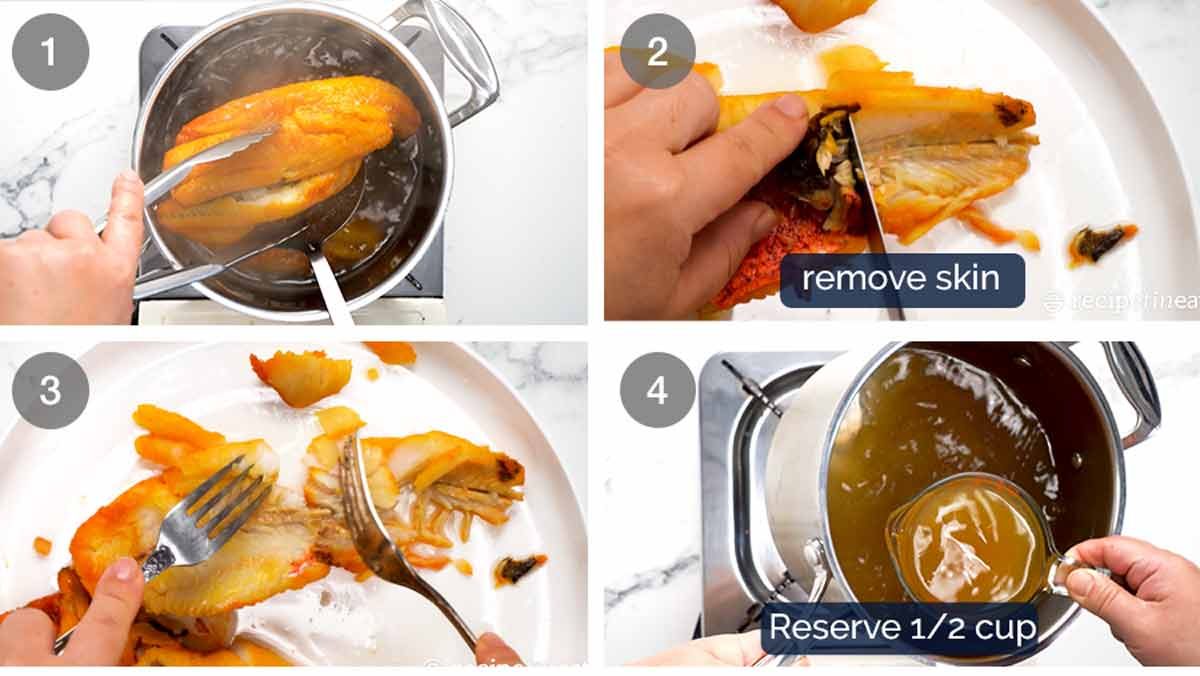
-
Poach fish 8 minutes – Bring the stock to a boil. Place the fish in then turn the heat down so the liquid is barely rippling. Poach for 8 minutes or until the flesh flakes.
-
Remove skin – Remove the fish from the poaching liquid and transfer to a plate. Remove and discard the skin – I find a butter knife helpful.
-
Flake the flesh into large chunks. Keep them large as they will break a little more when tossed through the rice.
-
Reserve 1/2 cup liquid – Measure out 1/2 cup (125 ml) of the poaching liquid. Set aside – we will drizzle this over the finished dish to moisten the rice.
Cook rice
Fish done. Now we cook the rice in the flavoured poaching liquid and make a cured butter to toss the rice in. You know this is going to be good!
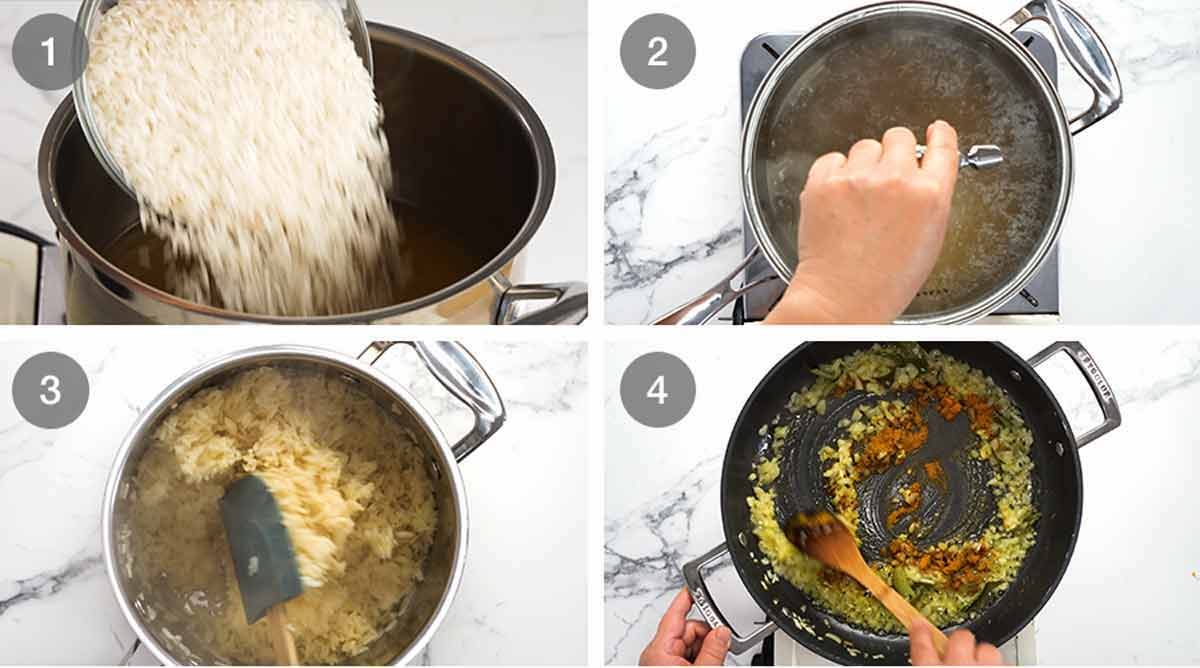
-
Add the rice into the poaching liquid then bring it to a simmer on high heat without the lid.
-
Cook 13 minutes – Place the lid on then turn the heat down to low. Cook for 13 minutes or until all the liquid has been absorbed. No peeking, no stirring!
-
Rest and fluff – Remove from the stove with the lid still on and rest for 10 minutes (lid still on!). Then fluff the rice, ready to toss into the curried butter!
-
Curried butter – While the rice is resting, start the curried butter. Melt the butter in a large skillet or pot (large enough to fit all the rice). Add the cardamom pods and curry leaves and stir for 30 seconds. Sauté the garlic and onion then stir in the spices. Be prepared for amazing smells!
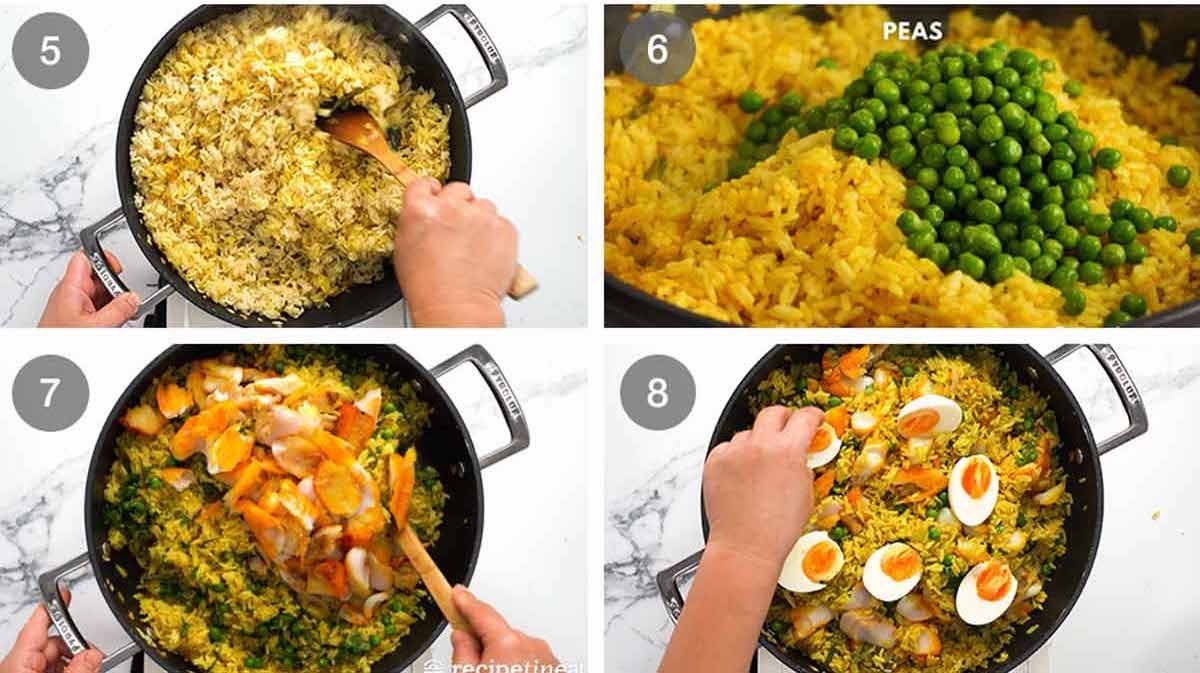
-
Add the rice and toss to coat in the curried butter. Add the reserved stock and toss through – this moistens the rice.
-
Peas and coriander – Add the thawed peas and most of the coriander (reserve a bit for garnish) and toss through. The heat from the rice is all that’s needed to cook warm through the thawed peas.
-
Fish – Add the flakes of fish and toss through gently, taking care to ensure there are some nice large chunks.
-
Stud with eggs – Tops with halved eggs and sprinkle with coriander. Then serve!
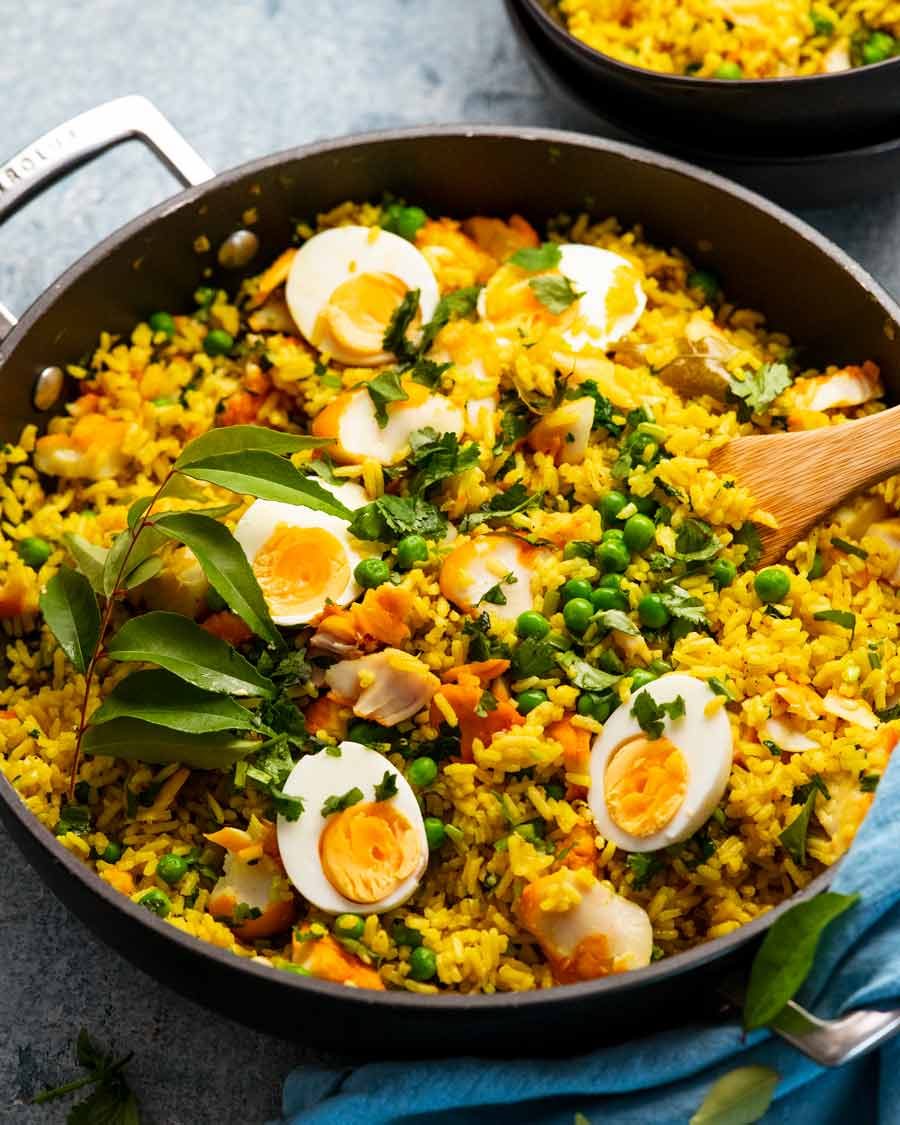
To serve, just spoon into bowls and eat as is. There’s no need for sauce – the rice is nice and moist, and there’s certainly no need for extra flavour!
It will keep for a few days in the fridge but it’s best freshly made as rice tends to dry out in the fridge overnight. Reheating is best done in the microwave with a sprinkle of water to make the rice nice and steamy again.
If you try this, tell me if you agree with my description of it as an English biryani!!! 🙂 – Nagi x
Watch how to make it
Hungry for more? Subscribe to my newsletter and follow along on Facebook, Pinterest and Instagram for all of the latest updates.
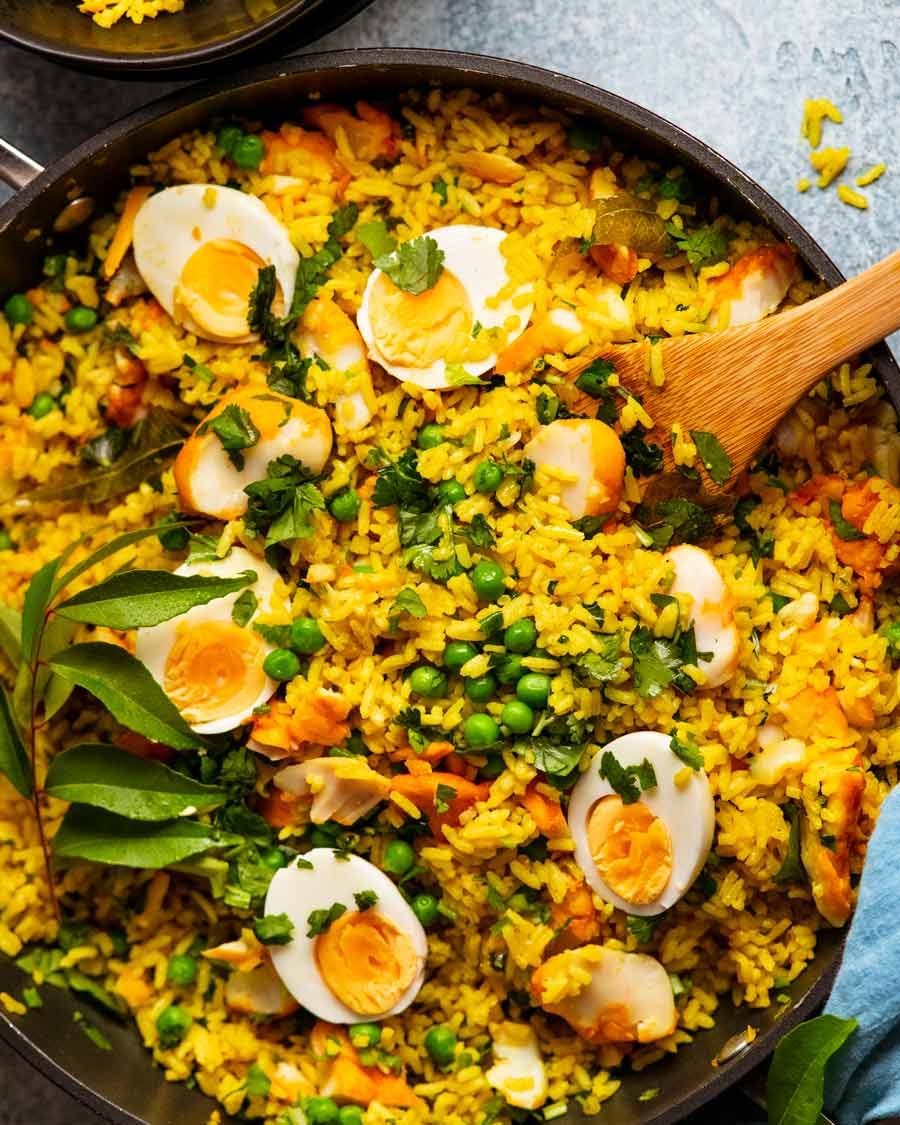
Kedgeree – British curried rice and fish
#wprm-recipe-rating-0 .wprm-rating-star.wprm-rating-star-full svg * { fill: #343434; }#wprm-recipe-rating-0 .wprm-rating-star.wprm-rating-star-33 svg * { fill: url(#wprm-recipe-rating-0-33); }#wprm-recipe-rating-0 .wprm-rating-star.wprm-rating-star-50 svg * { fill: url(#wprm-recipe-rating-0-50); }#wprm-recipe-rating-0 .wprm-rating-star.wprm-rating-star-66 svg * { fill: url(#wprm-recipe-rating-0-66); }linearGradient#wprm-recipe-rating-0-33 stop { stop-color: #343434; }linearGradient#wprm-recipe-rating-0-50 stop { stop-color: #343434; }linearGradient#wprm-recipe-rating-0-66 stop { stop-color: #343434; }
Ingredients
- 4 cups/ 1 litrechicken stock/broth, low-sodium (Note 5)
- 500g/1 lbsmoked haddock or cod, skin-on (or other smoked fish, Note 1)
- 2 1/4cupslong grain rice, uncooked
- 75g / 5 tbspunsalted butter
- 15curry leaves(optional, Note 2)
- 6green cardamom pods, lightly crushed (Note 3)
- 1brown onion, diced
- 2garlic cloves, finely minced
- 2tspcurry powder(anything! Use spicy if you want, I use mild)
- 1/2tspturmeric powder
- 1cupfrozen peas, thawed
- 1/2cupcoriander/cilantro leaves, roughly chopped (sub green onion or parsley)
- 3hard boiled eggs, halved or quartered (9 minute cook)
Instructions
-
Poach fish – Bring chicken stock to a boil in a large saucepan or small pot. Place fish in (it should all be just about submerged, Note 4) and adjust heat so the stock is barely rippling. Poach it gently for 8 minutes or until the fish flakes apart. Remove fish onto a large plate.
-
Flake fish – When cool enough to handle, discard skin (gently scrape with a butter knife) and flake fish into large pieces, checking for any bones.
-
Reserve stock – Measure out 1/2 cup of the poaching liquid and set aside for later (drizzle on at end to juice up the rice).
-
Cook rice 13 min – Add rice into the poaching liquid in the saucepan. Bring to a simmer over high heat. Cover with lid then reduce heat to low. Cook for 13 minutes.
-
Rest rice 10 min – Remove the saucepan from the stove with the lid on and rest for 10 minutes. Fluff rice using a rubber spatula.
-
Curried butter – While the rice is resting, melt the butter in a very large (30cm/12″) non stick skillet or pot, over medium-high heat. Add the cardamom pods and curry leaves and stir for 30 seconds. Add the onions, garlic and sauté for 5 minutes until browning at the edges, stirring regularly.
-
Toss rice – Lower heat to medium. Stir in the curry powder and turmeric, and then the rice. Toss the rice in the spiced butter until well coated and uniformly yellow. Pour over the reserved 1/2 cup of fish poaching stock, and toss to mix through (it moistens the rice).
-
Season with salt if required – Check the rice for seasoning. If you used store-bought packet stock, you should find there’s enough natural saltiness already. Otherwise season to taste and mix rice well.
-
Peas & fish – Stir through the peas and most of the coriander (hold some back for garnish). Then gently fold through the fish, taking care to keep some pieces in large chunks.
-
Serve – Spoon out rice onto one large platter or individual plates to serve. Top with boiled egg halves, and garnish with the remaining coriander. EAT!
Recipe Notes:
Life of Dozer
When I took the photo for a big Mother’s Day KitchenAid giveaway currently happening on Instagram….
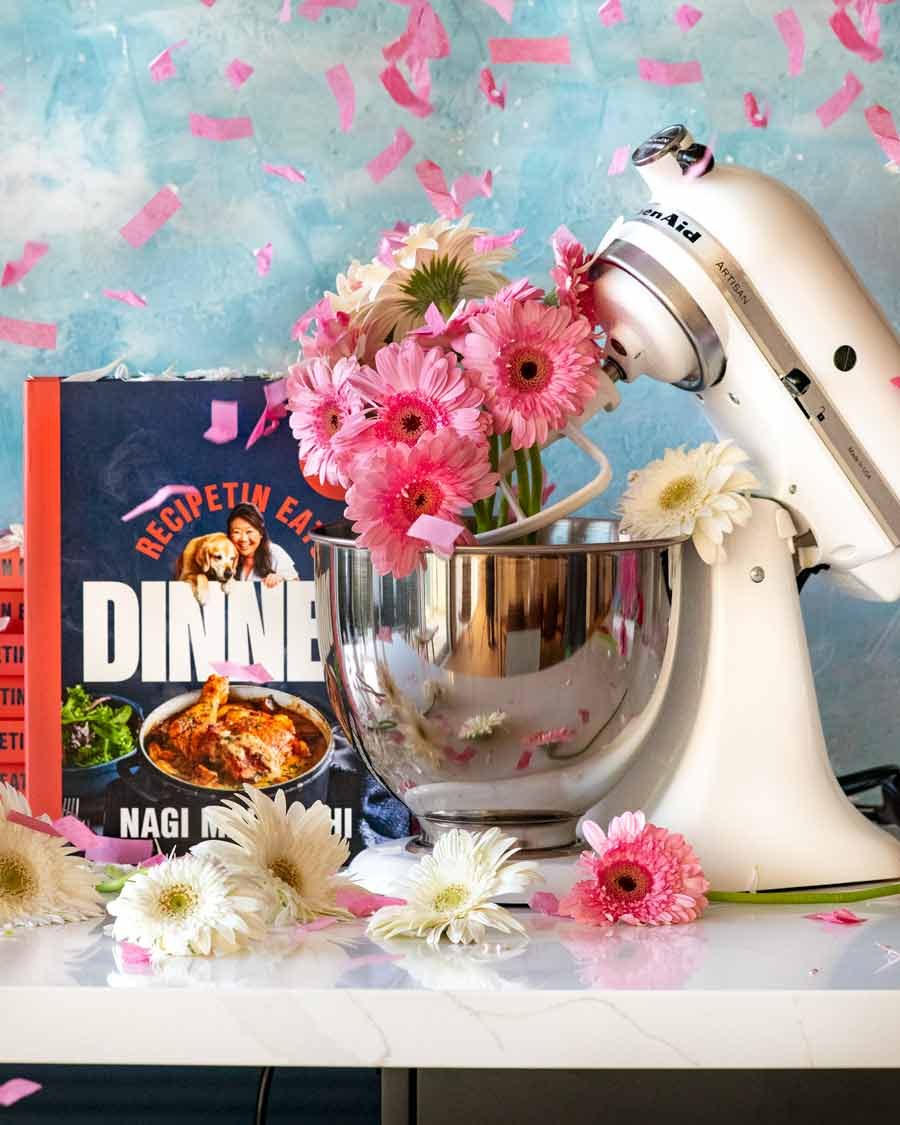
…..there’s just no way this wasn’t going to happen!! 😂

